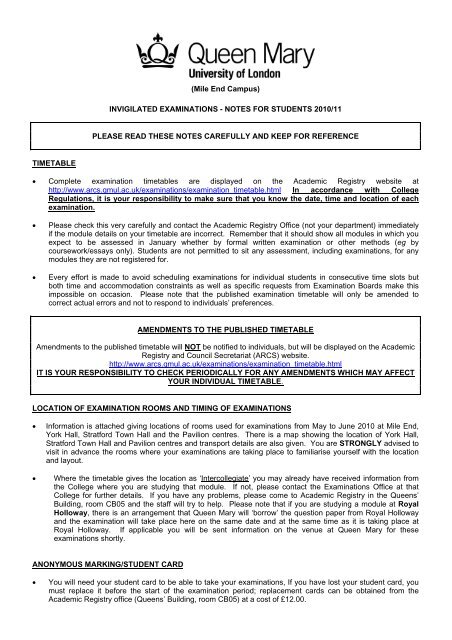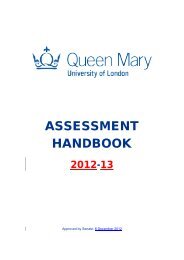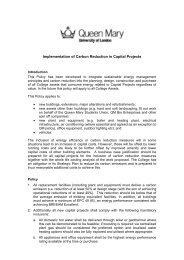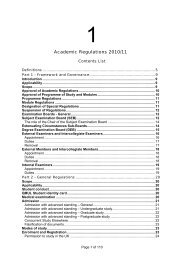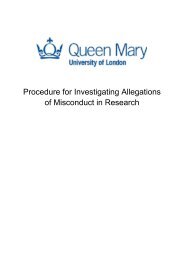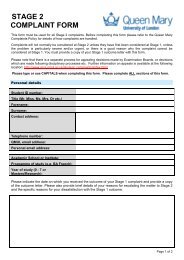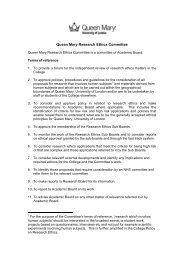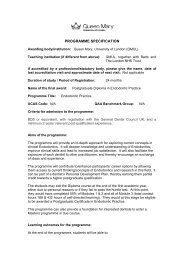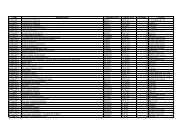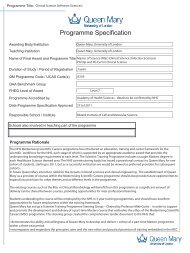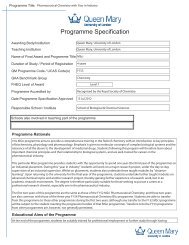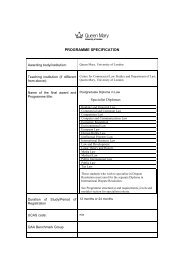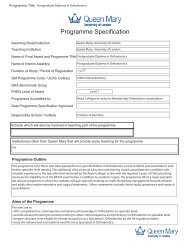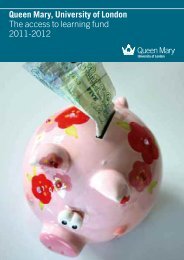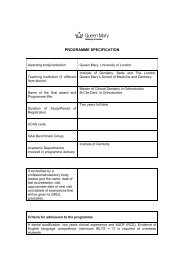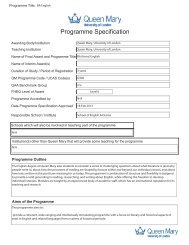INVIGILATED EXAMINATIONS - Academic Registry and Council ...
INVIGILATED EXAMINATIONS - Academic Registry and Council ...
INVIGILATED EXAMINATIONS - Academic Registry and Council ...
You also want an ePaper? Increase the reach of your titles
YUMPU automatically turns print PDFs into web optimized ePapers that Google loves.
(Mile End Campus)<br />
<strong>INVIGILATED</strong> <strong>EXAMINATIONS</strong> - NOTES FOR STUDENTS 2010/11<br />
PLEASE READ THESE NOTES CAREFULLY AND KEEP FOR REFERENCE<br />
TIMETABLE<br />
Complete examination timetables are displayed on the <strong>Academic</strong> <strong>Registry</strong> website at<br />
http://www.arcs.qmul.ac.uk/examinations/examination_timetable.html In accordance with College<br />
Regulations, it is your responsibility to make sure that you know the date, time <strong>and</strong> location of each<br />
examination.<br />
<br />
<br />
Please check this very carefully <strong>and</strong> contact the <strong>Academic</strong> <strong>Registry</strong> Office (not your department) immediately<br />
if the module details on your timetable are incorrect. Remember that it should show all modules in which you<br />
expect to be assessed in January whether by formal written examination or other methods (eg by<br />
coursework/essays only). Students are not permitted to sit any assessment, including examinations, for any<br />
modules they are not registered for.<br />
Every effort is made to avoid scheduling examinations for individual students in consecutive time slots but<br />
both time <strong>and</strong> accommodation constraints as well as specific requests from Examination Boards make this<br />
impossible on occasion. Please note that the published examination timetable will only be amended to<br />
correct actual errors <strong>and</strong> not to respond to individuals’ preferences.<br />
AMENDMENTS TO THE PUBLISHED TIMETABLE<br />
Amendments to the published timetable will NOT be notified to individuals, but will be displayed on the <strong>Academic</strong><br />
<strong>Registry</strong> <strong>and</strong> <strong>Council</strong> Secretariat (ARCS) website.<br />
http://www.arcs.qmul.ac.uk/examinations/examination_timetable.html<br />
IT IS YOUR RESPONSIBILITY TO CHECK PERIODICALLY FOR ANY AMENDMENTS WHICH MAY AFFECT<br />
YOUR INDIVIDUAL TIMETABLE.<br />
LOCATION OF EXAMINATION ROOMS AND TIMING OF <strong>EXAMINATIONS</strong><br />
<br />
<br />
Information is attached giving locations of rooms used for examinations from May to June 2010 at Mile End,<br />
York Hall, Stratford Town Hall <strong>and</strong> the Pavilion centres. There is a map showing the location of York Hall,<br />
Stratford Town Hall <strong>and</strong> Pavilion centres <strong>and</strong> transport details are also given. You are STRONGLY advised to<br />
visit in advance the rooms where your examinations are taking place to familiarise yourself with the location<br />
<strong>and</strong> layout.<br />
Where the timetable gives the location as ‘Intercollegiate’ you may already have received information from<br />
the College where you are studying that module. If not, please contact the Examinations Office at that<br />
College for further details. If you have any problems, please come to <strong>Academic</strong> <strong>Registry</strong> in the Queens’<br />
Building, room CB05 <strong>and</strong> the staff will try to help. Please note that if you are studying a module at Royal<br />
Holloway, there is an arrangement that Queen Mary will ‘borrow’ the question paper from Royal Holloway<br />
<strong>and</strong> the examination will take place here on the same date <strong>and</strong> at the same time as it is taking place at<br />
Royal Holloway. If applicable you will be sent information on the venue at Queen Mary for these<br />
examinations shortly.<br />
ANONYMOUS MARKING/STUDENT CARD<br />
<br />
You will need your student card to be able to take your examinations, If you have lost your student card, you<br />
must replace it before the start of the examination period; replacement cards can be obtained from the<br />
<strong>Academic</strong> <strong>Registry</strong> office (Queens’ Building, room CB05) at a cost of £12.00.
Students are identified on all examination answer books etc by their Student Identity Number, not by name.<br />
This is a nine digit number printed on the student card. It is essential that you have your student card with you<br />
at all examinations for this reason as well as for attendance checking. When in an examination room you must<br />
lay your student card on your desk with the examination number showing in order to assist the invigilator<br />
when checking attendance. Identity checks for security purposes are carried out periodically in some buildings<br />
where examinations take place.<br />
ARRIVAL AT THE EXAMINATION<br />
<br />
Posted outside each examination room will be a seating list, which shows the desk you have been allocated<br />
for that particular examination. You must only sit at the assigned desk unless specifically told otherwise by the<br />
senior invigilator.<br />
EQUIPMENT AND PERSONAL ITEMS<br />
<br />
<br />
<br />
<br />
<br />
<br />
<br />
Students are required to bring with them all writing aids <strong>and</strong> drawing materials necessary for the examination.<br />
These must be loose on the desk or contained in a clear plastic bag or pencil case.<br />
With the exception of writing materials, students may only bring to the examination desk books, papers or<br />
instruments that are authorised in the rubric of the question paper. Bags, coats, jackets <strong>and</strong> non-religious<br />
headwear must be left outside the room or in a space within the room indicated by the invigilator. For security<br />
reasons, it is recommended that wallets, purses, mobile phones <strong>and</strong> other electronic entertainment devices<br />
(e.g. mp3 players) are placed underneath the examination desk/chair for the duration of the exam; these may<br />
not be kept in pockets. Please note that QMUL accepts no responsibility for the loss or theft of students’<br />
personal belongings during examinations, <strong>and</strong> therefore you are advised not to bring unnecessary valuable<br />
items to an examination.<br />
Any item (including pencil cases <strong>and</strong> instrument cases) brought into the examination room may be inspected<br />
by an invigilator in the presence of the student. Students may also be required to empty their pockets on the<br />
request of an invigilator. Any refusal to cooperate will be recorded by the invigilator <strong>and</strong> treated as an<br />
assessment offence.<br />
Mobile phones: Regardless of location (be it in a bag or under a desk), mobile phones, communication<br />
devices <strong>and</strong> other electronic entertainment devices (e.g. mp3 players) must be switched off for the duration of<br />
the examination so they cannot be used or cause a disturbance. Please note that alarms on many phones will<br />
sound even when the h<strong>and</strong>set is switched off; alarms must be deactivated before the examination. Any device<br />
causing a disturbance will be confiscated by the senior invigilator, who will record the incident in his/her<br />
report. The owner will be informed that the incident will be investigated under the assessment offence<br />
regulations.<br />
Dictionaries: The use of dictionaries of any format is not permitted unless indicated in the rubric of the<br />
question paper.<br />
Food <strong>and</strong> drink: Except for medical reasons agreed by the Disability <strong>and</strong> Dyslexia Service, Students may not<br />
bring food or drink, other than bottled still water, into an examination room. Any other food or drink taken into<br />
an examination room will be confiscated by the invigilator.<br />
Electronic calculators are only permitted in those examinations where the rubric indicates that calculators<br />
are permitted. It is an assessment offence to use calculators in examinations where they are not permitted.<br />
Where their use is permitted in examinations, students:<br />
(i) must ensure that machines are of the h<strong>and</strong>-held type, quiet in operation <strong>and</strong> compact <strong>and</strong> with their own<br />
power supply;<br />
(ii) must accept responsibility for ensuring that the machine is in full working order <strong>and</strong> for providing in<br />
advance for alternative means of calculating in the event of the calculator failing during the examination.<br />
Every student using an electronic calculator will be required to state clearly on his/her script the name <strong>and</strong><br />
type of machine used. Please be aware that calculators may be examined at any time by the invigilator to<br />
ensure that they contain no pre-programmed information. The use of material stored in a preprogrammable<br />
memory constitutes an assessment offence.<br />
ARRIVING LATE / LEAVING EARLY<br />
<br />
Students are allowed to be admitted to the examination room up to 30 minutes after the start of the<br />
examination. After this period a c<strong>and</strong>idate can only be admitted to the examination room if no other c<strong>and</strong>idate<br />
for the same paper has left the room. No additional time shall be allowed to latecomers.
Students are not allowed to leave the examination room within the first 30 minutes or the final 15 minutes of<br />
the examination other than for medical reasons <strong>and</strong> they must be accompanied at all times if they intend to<br />
return to the examination.<br />
DURING THE EXAMINATION<br />
<br />
<br />
<br />
<br />
<br />
<br />
Ensure that you have the correct version of the question paper. If your exam mode is R (resit) or U (first sit)<br />
the examination board may have prepared a different version of the question paper for you <strong>and</strong> will be able to<br />
confirm to you whether this is the case (not all resit/first sit papers have different question papers). If your<br />
exam mode is O (retake) you should take the normal paper.<br />
Write your student identity number <strong>and</strong> desk number on the front of all answer scripts or supplementary<br />
booklets/sheets, including graph paper. Do not write your name.<br />
Read the rubric of the question paper very carefully. This will show whether or not reading time is permitted,<br />
which questions are compulsory, how many questions must be answered etc. All answers to the questions<br />
must be in English unless otherwise indicated. Where an examination paper indicates a period of reading time<br />
is allowed, you must not start reading the questions until instructed to do so by the invigilator.<br />
The use of scrap paper is not permitted; rough work must be done on the stationery provided then clearly<br />
crossed through. Unless stated in the rubric of the question paper, you are not permitted to use notes during<br />
an examination. Please ensure that you have no notes on your person, in your pockets or in your pencil case.<br />
It is an assessment offence to have any unauthorised material with you during an examination, <strong>and</strong> if found<br />
with any notes (in paper or electronic format) the incident will be considered an assessment offence.<br />
Students must write legibly. Illegible h<strong>and</strong>writing will not be transcribed, nor will you be permitted to dictate the<br />
contents. Any part of a script that is considered by an examiner to be illegible will be awarded no marks.<br />
Unless the rubric states otherwise, supplementary answer books should only be used when the main answer<br />
book is full <strong>and</strong> should be tied inside the back of the main answer book with the treasury tag provided.<br />
END OF THE EXAMINATION<br />
<br />
<br />
<br />
Students must stop writing promptly when directed <strong>and</strong> remain quietly in their seats until all scripts have been<br />
collected <strong>and</strong> they have been given permission to leave.<br />
Answer books <strong>and</strong> all other materials provided must be left on the desk or h<strong>and</strong>ed to the invigilator. Students<br />
are not allowed to remove the question paper from the examination room. It is an assessment offence to<br />
remove any examination stationery from the room.<br />
Leave the area of the examination room as quickly <strong>and</strong> quietly as possible to prevent disruption to other<br />
students who may be sitting an examination of a different duration in an adjacent room.<br />
ABSENCE FROM AN EXAMINATION<br />
<br />
If you are absent from an examination because of illness or other good cause, it is essential that submit a<br />
claim for extenuating circumstances with supporting documentary evidence e.g. a medical certificate, no later<br />
than 24 hours before the meeting of the relevant Examination Board. Please contact your department for the<br />
dates of these meetings. Students who are absent from an examination <strong>and</strong> who do not provide valid<br />
extenuating circumstances will be given a mark of zero.<br />
DISRUPTED <strong>EXAMINATIONS</strong><br />
<br />
In order to preserve the integrity of the examination process, QMUL has implemented various measures to<br />
ensure that any disruption to examinations will have minimal or no impact. In the unlikely event that an<br />
examination is terminated, it will be rescheduled at the earliest opportunity where possible.<br />
In cases where malicious disruption is proven, QMUL will prosecute those responsible.<br />
ASSESSMENT OFFENCES<br />
<br />
Students are reminded that the possession of unauthorised material in an examination is an assessment<br />
offence <strong>and</strong> the st<strong>and</strong>ard penalty for such material is failure (a mark of 0X) in every module taken during the<br />
academic year. If you are suspected of committing an assessment offence then you will be contacted by the<br />
<strong>Academic</strong> Secretariat via your QMUL e-mail account, requesting your presence at an interview. If you do not
espond within five working days of the e-mail being sent (or attend the interview), the case against you will<br />
proceed on the assumption that you have admitted the offence.<br />
Students should note that the Assessment Offences Regulations state that the possession of<br />
unauthorised materials at any time when a student is under examination conditions or hiding<br />
unauthorised materials in examination venues, including cloakrooms <strong>and</strong> toilets, is an assessment<br />
offence. Unless specified in the rubric of the question paper, dictionaries of any format, statutes <strong>and</strong> other<br />
documents are not permitted in the examinations. Possession of such unauthorised materials will be deemed<br />
an assessment offence.<br />
Students are strongly advised to ensure that any notes or other learning aids are stored safely within<br />
a bag or coat in the cloakroom or designated area. DO NOT leave unattended, or discard, any notes in, or<br />
around the examination venue, including the toilets. Any unauthorised materials found in the examination<br />
venue or hidden in the cloakrooms or toilets will be treated as if they had been found in the possession of the<br />
owner.<br />
Notes stored on electronic devices such as mobile phones or mp3 players are also treated the same way as<br />
paper notes. Please note that it is an offence simply to be in possession of any unauthorised material <strong>and</strong><br />
the penalty is the same whether or not it was a mistake or there was intent to use the material.<br />
Students should note that any of the following are also assessment offences:<br />
Gaining unauthorised access to any examination paper before it has been set<br />
Forging an examination timetable produced by QMUL<br />
Causing a disturbance during an examination either physically, verbally or via an electronic device<br />
Refusing to cooperate with an invigilator or follow an invigilator’s instructions<br />
Accessing or using prohibited sources of information on a PC or other device during an examination<br />
Impersonating another student in an examination or the employment of an impersonator in an<br />
examination.


